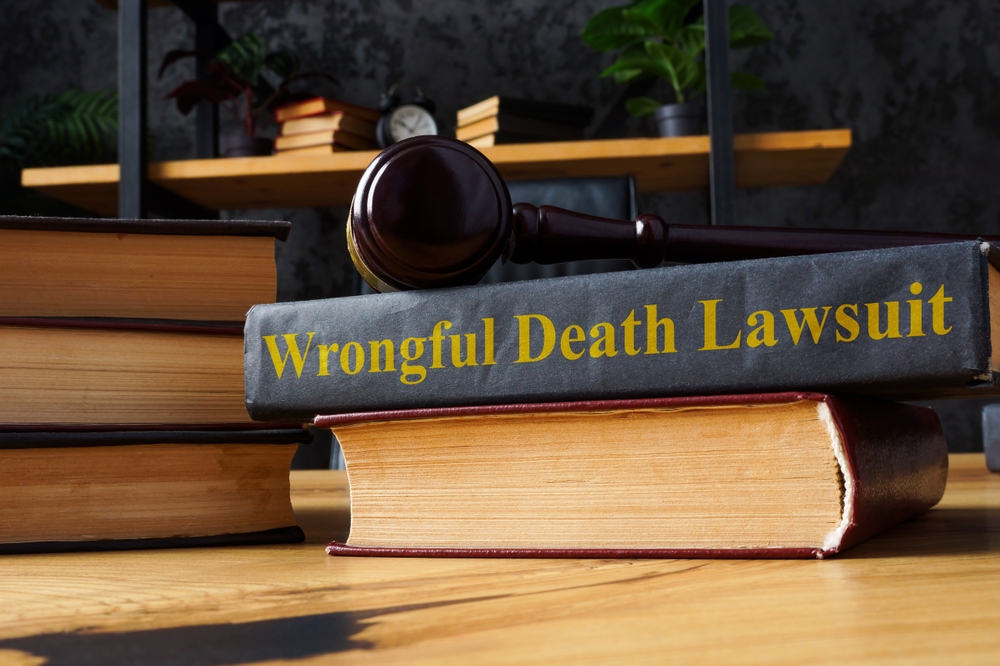Typically, individuals legally recognized as the deceased's representative or beneficiaries, such as close family members, can file a wrongful death suit.
While this may sound straightforward, these cases often involve more nuances and legal guidelines than one might expect. Understanding who qualifies and how claims are structured is crucial to navigating this challenging process.
Working with experienced wrongful death attorneys can provide much-needed clarity for those dealing with this kind of loss. They can help your family understand your eligibility to file, guide you through the legal process, and ensure that your efforts to seek compensation address pressing financial concerns like end-of-life costs.
With the right support, you can find a way to honor your loved one's memory while pursuing justice in a meaningful way.
What Is a Wrongful Death Suit?

This legal action is brought by specific individuals when someone's life is lost due to the negligent, reckless, or intentional actions of another party. It's a way to hold those responsible accountable for their actions and the financial and emotional toll their behavior has caused your family.
These lawsuits do not seek to assign a monetary value to a person's life. Instead, they provide a framework for seeking justice and securing the financial support families need to move forward during an incredibly challenging time.
However, navigating the legal procedures for these cases is rarely straightforward.
Complex processes, strict filing deadlines, and the need to establish clear evidence of negligence can make these cases overwhelming for families grieving their loss.
Without experienced legal guidance, it's easy to encounter obstacles that delay or jeopardize the claim. By working with skilled wrongful death attorneys, families can focus on healing while ensuring their case is handled with precision and care.
Who Has the Right to File a Wrongful Death Lawsuit?
Legally, this process starts with a personal representative of the deceased's estate entrusted with filing the lawsuit on behalf of eligible family members. Once the suit is initiated, it's important to understand how the law prioritizes certain family members in the claim.
Priority Groups for Wrongful Death Cases
Immediate Family Members
The law generally gives the highest priority to the deceased person's immediate family. This could include:
- The surviving spouse
- Biological or adopted children
- Stepchildren financially dependent on the deceased
These relationships often represent the deepest emotional and financial losses after someone's passing, so immediate family members are typically the first to have the legal right to recover damages and losses.
Parents, Siblings, and Dependents
If no spouse or children exist, the next group eligible are:
- Parents of the deceased
- Siblings, including biological and adopted
- Any other family member who was financially dependent on the deceased at the time of their passing
Financial dependence plays a key role here, as it establishes how vital the deceased person's support was to those seeking compensation.
Extended Family Members
When there are no immediate family members or dependents, the court may permit extended relatives such as:
- Grandparents
- Other close relatives, if they were significantly affected by the loss
While less common, these cases still recognize that family ties and reliance can extend beyond nuclear relationships.
Key Limitations on Who Can File
Not everyone close to the deceased is allowed to pursue a lawsuit. Keep these important limitations in mind:
- Non-family members, such as friends or roommates, are not eligible under these laws
- Even deeply personal or emotional connections don't override the guidelines for who qualifies as a statutory beneficiary
This process can feel rigid and complicated. However, it intends to ensure fairness and clarity in determining who has the right to seek justice through legal channels.
What Compensation Can Families Claim?

When a loved one passes away due to someone else's negligence, the loss feels immeasurable. While no amount of money can replace them, compensation from a wrongful death claim can ease the financial strain left in the wake of tragedy.
These funds are meant to cover the expenses and losses families face, allowing them to focus on healing. Here's what families should know about what compensation can include and what factors may affect the outcome.
Financial Burdens That Compensation Can Address
A wrongful death lawsuit aims to cover a wide range of losses, both financial and emotional. These damages can help families handle the immediate and long-term challenges that result from an untimely death:
- Funeral and burial costs: The cost of laying a loved one to rest can be staggering. The average funeral in the U.S. ranges from $7,000 to $12,000, with traditional burials often exceeding this amount.
- Medical expenses before passing: Hospital and treatment bills can pile up quickly, especially if life-saving efforts were made before the loved one passed.
- Loss of income: If the deceased was the primary breadwinner or contributed significantly to household income, their absence creates a financial gap. Families often need to replace lost wages or the income they would have earned over their lifetime.
- Loss of benefits: Beyond regular earnings, families may lose access to health insurance, retirement contributions, or pensions tied to the loved one's employment.
- Childcare or elder care costs: If the deceased provided essential caregiving, families may face the expense of hiring professional services.
Compensation may go beyond monetary expenses. Families can also pursue damages for non-economic losses, such as:
- Loss of companionship: Losing a partner, parent, or sibling creates an emotional void. The courts recognize this pain as part of compensation.
- Parental guidance: If a child loses a parent, damages can reflect the absence of parental care, love, and mentorship.
- Mental anguish: Surviving family members often experience anxiety, depression, and grief that disrupt their lives.
To recover these or any other damages and losses in a lawsuit, your attorney will need to demonstrate that the other party's negligence directly caused your loved one's death. Strong evidence, such as police reports, medical records, or eyewitness testimony, often strengthens a case.
Why Seeking Compensation Matters
The financial impact of a wrongful death is often much greater than families initially anticipate. Here's why pursuing compensation is critical:
- Unplanned expenses add up quickly: When faced with funeral costs, medical bills, and the sudden loss of income, families can be overwhelmed. Studies show that 56 percent of Americans struggle to cover $1,000 in unexpected expenses. A wrongful death claim seeks to ease this burden.
- The long-term impact can be substantial: Beyond the immediate aftermath, families face ongoing costs such as mortgage payments, education expenses, and caregiving. Financial compensation provides stability as families rebuild their lives.
- Justice and accountability: Pursuing compensation not only ensures financial support but also holds negligent parties accountable for their actions.
No family should have to endure the burden of financial strain after losing a loved one to negligent, reckless, or careless actions. Compensation from a lawsuit can provide the resources you need to move forward.
When Do I Need A Lawyer?

Losing a loved one because of someone else's negligence is life-changing. But how do you know if hiring a wrongful death lawyer is the right step? There are many situations where legal guidance may be necessary, including but not limited to:
- Was a careless driver involved in a fatal accident? Drunk driving, reckless speeding, or ignoring traffic laws can lead to fatal crashes. When death results, surviving loved ones may be able to seek compensation with the help of a wrongful death attorney.
- Did a trusted healthcare provider make a mistake? Misdiagnoses, surgical errors, or improper treatments may have contributed to your loved one's passing. You may be able to hold these parties or entities financially responsible for their negligence.
- Were unsafe conditions responsible for a workplace injury? Construction sites and other hazardous work environments are often the backdrop for fatal accidents. Despite the unintentional death, site managers, third parties, and other entities could be held liable for the loss of your loved one.
- Did a defective product harm your loved one? Items like faulty machinery, defective auto parts, or unsafe pharmaceuticals have led to countless preventable deaths. If you have lost a loved one from a defective or dangerous product, don't hesitate to contact a reputable personal injury law firm that can help you explore your rights and legal options in a wrongful death case.
- Did unsafe property conditions lead to tragedy? Neglected maintenance, dangerous stairs, or unsecured swimming pools are just some examples where property owners could be at fault for the death of your loved one.
- Were there preventable circumstances that went unaddressed? Sometimes, a lack of proper safety measures or clear negligence can result in devastating outcomes. When this happens, a lawyer can help you identify the factors that lead to your loved ones passing and fight to secure the compensation your family deserves.
Seeking justice is not just about addressing the past; it's about ensuring a more secure future for those left behind. By understanding your rights with the help of an experienced wrongful death lawsuit lawyer, families can take the necessary steps toward finding answers, accountability, and a sense of closure.
Wrongful Death Claim Eligibility FAQs
What is the statute of limitations for filing a wrongful death claim?
The statute of limitations sets a specific time limit for filing a lawsuit, and missing this deadline can prevent your family from seeking compensation. While the time frame can vary depending on the circumstances of the case, it's crucial to act promptly. Consulting with an attorney early on can help ensure your rights remain protected.
Can non-immediate family members bring a wrongful death lawsuit?
Generally, immediate family members like spouses, children, or parents are prioritized when filing a lawsuit. However, in cases where no immediate family is eligible, other dependents or close relatives may have the right to pursue the claim. Understanding your standing within these legal guidelines can help determine the path forward.
What if the deceased person was partially at fault for the incident?
Even if your loved one may have been partly responsible, you might still be able to recover damages depending on the state's laws regarding fault. The court may reduce compensation based on their level of responsibility. This highlights the importance of gathering evidence to clarify the full circumstances of the case.
Can compensation include future financial losses?
Compensation may account for future earnings and benefits the deceased would have provided, such as income or retirement contributions. This forward-looking approach ensures families are supported despite losing long-term financial security.
What happens if multiple eligible family members want to file a claim?
When multiple family members are eligible, courts often prioritize claims brought on behalf of the entire family or estate. This avoids overlapping lawsuits and ensures compensation is fairly distributed. Working with legal counsel can help families navigate these complex situations while maintaining unity.
Do You Want To File A Wrongful Death Suit? Contact Right Path Law Group For Comprehensive and Compassionate Legal Support.
Losing a person you love because of someone else's negligence is a life-altering hardship. But you don't have to carry the burden of seeking justice on your own.
Speaking with a Manassas personal injury lawyer allows your family to hold negligent parties accountable while creating the foundation for financial stability in the future.
Are you ready to learn more about your legal options? Take the first step by reaching out to a Right Path Law Group wrongful death attorney online or at 571-568-8676 to discuss your unique situation and explore whether filing a lawsuit is the right choice for your family.
